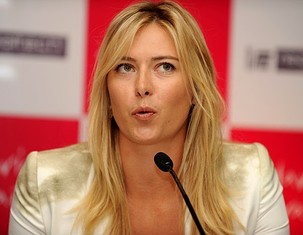
New Delhi, November 12: “Beauty sells“, Maria Sharapova had once famously remarked, an ironic statement from someone who evokes a sense of awe and admiration both for her tennis and drop-dead gorgeous looks.
At 25, she presents a perfect picture. Four time Grand Slam champion, hugely talented, stunning looks, earnings in the range of $25 million a year the highest for a women athlete worldwide a long queue of endorsements, modelling assignments and fans across the globe.
On Sunday, during her maiden visit to the country, the Russian displayed that she had a funny bone and is experimental too. “I began my day with a dosa in breakfast; it came on the chef's advice!” Sharapova beamed.
Year 2012 has been special for her. After a shoulder surgery in 2008, the former world number 1 clawed her way back to the top again, with a remarkable French Open win this season and was followed by silver at the London Olympics.
“The French Open win this year was extra special. I was injured for a year. And to come back with a different perspective about how to get into winning positions and to learn how hard it is to convert them into wins... it was an incredible experience that I will never forget,” she said.
“After a rewarding season, I get to visit a country that is new for me and I haven't explored before. People appreciate what you do and that means a lot to me.”
On the surface, hers seems like a fairy tale story. But ask her, and the ever-smiling beauty throws open a window into her private world which was anything but perfect as she grew up in Sochi, Russia.
“I come from a very normal, average family. In fact my mother was still a student when she gave birth to me. My father had to look for so many jobs and we kept moving (from one city to another). We have seen hard times and looking back, tennis wasn’t such a big sport at that time,” comes the honest reply.
Critics believe that her background added to her success. “At the end of the day, I am glad that my family was never afraid to support me. They saw a fire in my eyes, one day hopefully I become the number 1 in the world. And I consider myself very lucky that they carried the belief.”
“It was a big decision for them to move to the US and they were never afraid to give me what I needed. It helped me at every step of the way what I am today,” Sharapova confesses. She now has plans to continue the upward journey in 2013 and said her rivalry with Serena Williams of the US were among the factors “that helped make tennis competitive.”
“Serena is an incredible athlete. It is great to have rivalries in sport as it makes the competition better. You try to keep working hard and change the result in future,” she said.





Comments
Add new comment